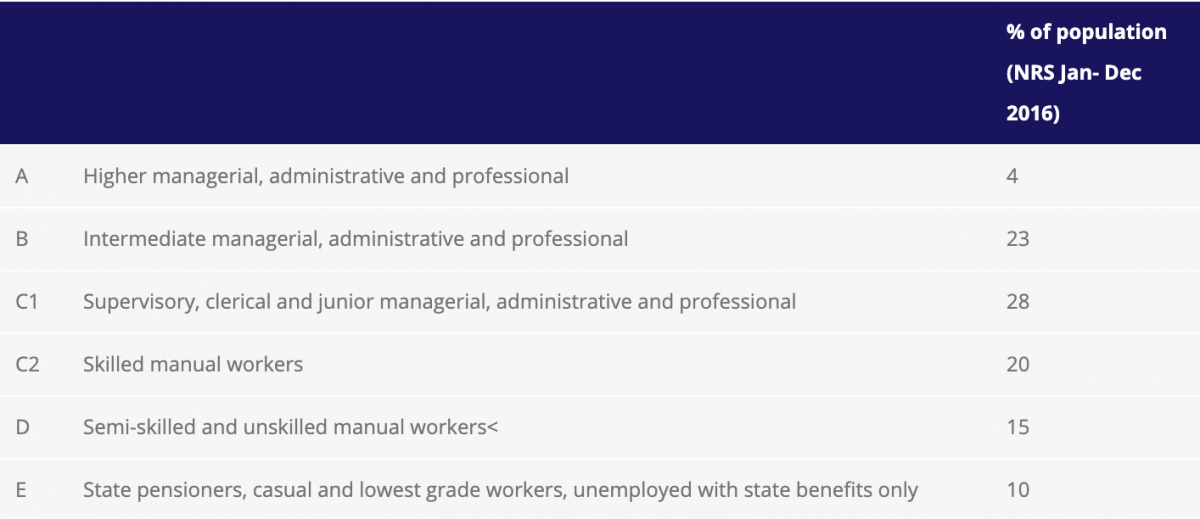The question they posed themselves: “Is socioeconomic position associated with use of e-cigarettes among those who formerly smoked, and has use e-cigarette use changed over time?”
The team believe monitoring the situation is important as, “without the benefit of protecting against relapse to smoking, their long-term use is likely to be harmful.”
To answer it, they analysed data obtained from almost 35,000 former smokers who had been smoke-free for at least one year.
Respondents were classified according to socioeconomic position:

“Living in social housing has been reported to be an independent risk factor for smoking in England. Therefore, sensitivity analyses were conducted with housing tenure as an alternative measure of socioeconomic position. This measure was collapsed to 2 groups, social housing (local authority or housing association) and other (mortgage bought, owned outright, private renting, and other).”
The team noted vaping increased among all participants during the five years covered, “but was highest among those with lower socioeconomic position.”
They also observed that “post-cessation initiation of e-cigarettes” (taking up vaping after successfully quitting smoking), “has increased over time but is not likely to affect smoking-related health inequalities because there were no differences by socioeconomic position.”
The results contrasted with those from the United States, “in which e-cigarettes are similarly popular, [but] e-cigarette use is more likely among individuals with socioeconomic advantage who used to smoke.”
The team believe the results are likely to reflect the continued use of e-cigarettes after smoking cessation and that this explains increased usage.
“Such socioeconomic patterning in e-cigarette use is important, considering that studies have shown that those who formerly smoked and now vape reported greater confidence in not smoking compared with those who do not vape.”
An increase in the number of older vapers (mean age, 63.6 years) was explained as they, “may have taken up e-cigarettes to prevent relapse to tobacco smoking or because of the attractive nicotine delivery properties and decreased harm profile of the devices.”
“Given that these individuals had maintained abstinence from smoking without any assistance from e-cigarettes, it is plausible that they would have been able to remain abstinent in their absence.”
Related:
- “Association of Socioeconomic Position With e-Cigarette Use Among Individuals Who Quit Smoking in England, 2014 to 2019” by Kock, Brown, and Shahab – [link]
- Lead author Loren Kock on Twitter – [link]
- UCL Tobacco and Alcohol Research Group (UTARG) – [link]
Dave Cross
Journalist at POTVDave is a freelance writer; with articles on music, motorbikes, football, pop-science, vaping and tobacco harm reduction in Sounds, Melody Maker, UBG, AWoL, Bike, When Saturday Comes, Vape News Magazine, and syndicated across the Johnston Press group. He was published in an anthology of “Greatest Football Writing”, but still believes this was a mistake. Dave contributes sketches to comedy shows and used to co-host a radio sketch show. He’s worked with numerous start-ups to develop content for their websites.
Join the discussion
Parliament Fears Two
The Department for Environment, Food and Rural Affairs faced questions from a Conservative MP and, oddly, a member of the Department for Environment, Food and Rural Affairs
Harm Reduction For The Rich
The United Kingdom risks becoming a harm reduction country only for the wealthy, according to Michael Landl of the World Vapers’ Alliance
Sacrificing Health For 2p Cut
Tory Government alienates vaping voters with its mission to cut tax by an unaffordable 2p to attract voters by placing a tax on vape products in the forthcoming budget
Scotland Announces Single-Use Vape Action
A ban on the sale and supply of single-use vapes in Scotland is due to come into effect on 1 April 2025, under proposed legislation published today






-listing400.jpg)




